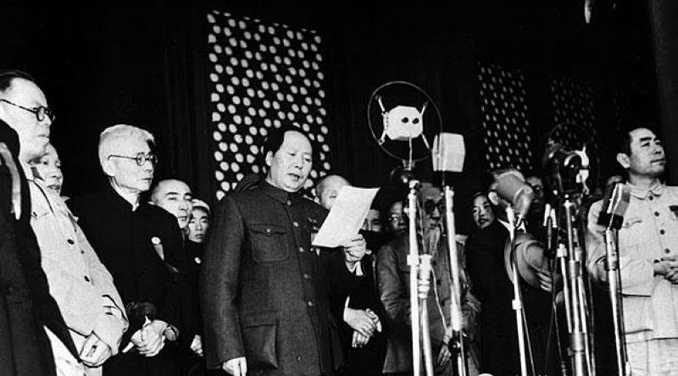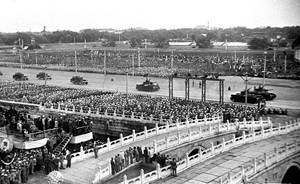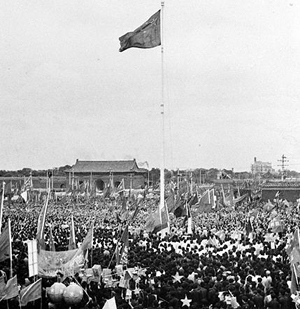
Written by: Ismail Umar
Posted on: October 01, 2014 | 
Chinese Ambassador H.E. Mr. Sun Weidong, Chairman Pakistan-China Institute Senator Mushahid Hussain and Information Secretary Mohammad Azam inaugurate the exhibition
On 29th September 2014, the Pakistan National Council of Arts in Islamabad hosted a Retrospective Photographic Exhibition commemorating the history of friendship between Pakistan and China. The event was organized by the Cultural Counselor's office of the Chinese Embassy and was attended by H.E. Ambassador of China to Pakistan, Mr. Sun Weidong, Chairman of the Pakistan-China Institute Senator Mushahid Hussain Sayed, Secretary of Information Mr. Mohammad Azam, and Cultural Counselor of China, Mr. Zhang Yingbao. The exhibition was a celebration of years of companionship between Pakistan and China and it served to endorse future contact and friendship between the two nations. The photographs presented more than fifty years of socio-cultural exchanges, trade agreements, as well as strategic cooperation in various fields.
Ambassador Sun Weidong expressed how proud and touched he was to see the photographs displayed at the exhibition, which substantiate the Pakistan-China bond and provide a model for future generations of both countries. He said that the Chinese regard the Pakistanis as their “Iron Brothers”. He further added that China sympathizes with the Pakistanis who have been affected by the recent floods, and assured that China will endeavor to assist them as well as the IDPs. He also stressed on the importance of increasing interaction between think-tanks in both countries, which would encourage socio-cultural interaction and help bring Pakistan and China closer together.
In his address to the audience, Senator Mushahid Hussain stated that this exhibition demonstrates the resilience of Pak-China friendship. He asserted that this companionship transcends governmental contact and reaches a much deeper, personal level. He explained the importance of culture-to-culture relations, stating that they are necessary for two nations to truly connect with one another.
Mohammad Azam stated that Pakistan and China have supported each other through and through. He expressed delight over the introduction of the Chinese language in a number of Pakistani schools. He further added that Pakistan enthusiastically awaits the arrival of Chinese president Xi Jinping to Pakistan.
 |
Chairman Mao declares the establishment of the People's Republic of China on 1st October, 1949 |
The National Day of the People’s Republic of China (PRC) is celebrated every year on October 1st throughout the country with a variety of festivities organized by the Chinese government. These include musical concerts, fireworks, and celebratory decorations in prominent public places such as Beijing’s Tiananmen Square. This is accompanied by the public display of the portraits of renowned leaders such as the Chinese Communist leader and founder of the People’s Republic of China, Chairman Mao Zedong.
 |
On October 1st, 1949, the Chinese Communist Party (CCP), under Chairman Mao’s leadership, officially declared the establishment of the People’s Republic of China after finally defeating the Nationalist Party of Kuomintang (KMT), whose popular support had plummeted due to years of mismanagement and corruption. This was a major, transformative event, not just in Chinese history but for the whole world, and is considered by Marxists as one of the greatest events in human history. Widely recognized as the world’s first communist peasant revolution, it finally brought an end to the full-blown civil war between the Communists and Nationalists which had been ongoing since World War II. The establishment of the PRC also concluded the long-standing process of instability and disorder in China which had been continuing since the Chinese Revolution of 1911.
 |
China’s shift towards Communism changed the course of global history. The West realized that this would cause a major eastward shift in the global balance of power, since the Soviet Union now had a new powerful eastern ally, enabling them to focus their military power towards the west. Hence this also led to the suspension of diplomatic relations between PRC and the United States for decades, which has had an immense influence on world politics.
Chairman Mao’s Communist Revolution of China was successful because of the dreadful economic and political conditions that had prevailed in the country prior to the revolution, caused by unjust forms of feudalism. China’s age-old agricultural problems had remained unresolved and it continued to be a semi-feudal, semi-colonial and backward country that was heavily reliant on imperialism. These conditions led to the formation of a reactionary bloc that strove to make a change and was eventually successful in bringing about the Communist Revolution under Chairman Mao in 1949.
You may also like: